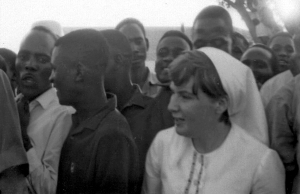 I was born at Tyringham Hall, a country house in Buckinghamshire in 1944 (but only because the East End Maternity Hospital was evacuated there during the war – it gave me delusions of grandeur for the rest of my life). Aged 12, after a dreary post-war London childhood I stepped out into the light, when my father was appointed Deputy Town Clerk in Broken Hill, Northern Rhodesia. There I attended King George VI High School, an institution where Maths and Latin teachers passed through at such a rate that I cannot remember most of them or much that they tried to teach. Then 1962 was a traumatic year boarding at Lusaka’s Jean Rennie Girls’ High School (boarding shool at 17!!!) but mercifully my classes were all at its brother school and there I passed my A-levels.
I was born at Tyringham Hall, a country house in Buckinghamshire in 1944 (but only because the East End Maternity Hospital was evacuated there during the war – it gave me delusions of grandeur for the rest of my life). Aged 12, after a dreary post-war London childhood I stepped out into the light, when my father was appointed Deputy Town Clerk in Broken Hill, Northern Rhodesia. There I attended King George VI High School, an institution where Maths and Latin teachers passed through at such a rate that I cannot remember most of them or much that they tried to teach. Then 1962 was a traumatic year boarding at Lusaka’s Jean Rennie Girls’ High School (boarding shool at 17!!!) but mercifully my classes were all at its brother school and there I passed my A-levels.
Back in those days, “without the Latin” one couldn’t do an arts degree, so by default it was a B.Sc (Econ) at the University College of Rhodesia and Nyasaland in Southern Rhodesia. Here I lived for the first time in a multiracial community and made African friends. I also discovered Social Anthropology, a subject I fell in love with and one that was seen as dangerously seditious by many in pre-Independence Central Africa.
Politics was important throughout my university career. The Federation of Rhodesia and Nyasaland broke down at the end of my first year and Zambia gained its Independence during my second year. Half way through my finals in November 1965, Rhodesia made its Unilateral Declaration of Independence, making it hard to concentrate the remaining exams. The next year, the Rhodesian Government deported all the anthropology lecturers, actually saying that they were stirring up revolt by teaching untruths about racial equality!
I joined the Zambian Civil Service as a Professional Officer in the Central Statistical Office, where I worked on the construction of the first urban cost of living index. It was a wonderful job that took me into the shanty-towns springing up around Lusaka, but I had my sights set on an academic career, and left to do an M.Phil at University College, London.
After one grey winter living below the bread-line, wondering whether it would ever stop raining, the delights of “swinging” London had worn thin. On the verge of dropping out, I persuaded my supervisor, to let me return to Zambia to do fieldwork. I spent five months living in Chief Kalaba’s Village in the Luapula Province, collecting the data for a thesis on the relationship between the subsistence and cash economy. While I was there, a civil war broke out in the Congo and the Luapula Province was virtually cut off from the rest of Zambia (we also had a cholera epidemic and a rabies outbreak).
By the time I had completed the M.Phil in 1968, few non-Zambians were being recruited in any of the fields I was qualified in so I took a post as a research assistant at Portsmouth Polytechnic. The Poly became the University of Portsmouth and became a Principal Lecturer. Along the way I picked up a Ph.D from the London School of Economics with a thesis on spinsters in Hampshire (that was a bit of a change, but it fitted in with teaching). I started doing research in India, married and had a son who is now the writer/musician Louis Barabbas. I wrote a few books and I always loved teaching.
After I retired in 2004, I took part-time lectureships at several British Universities, then visiting fellowships at the University of Canterbury, Christchurch and the National University of Singapore. I also started to think seriously about Zambia for the first time since my parents had left the country in 1973. Suddenly I wanted to know what Zambia was like now and what had happened to the population I had been part of in those colonial times. When I went back in 2007 I discovered Zambia felt more like home than ever, now go as often as I can, most recently in October 2014 for the celebrations of 50 years of Independence.
Books
Worlds Of Desire, Realms Of Power
